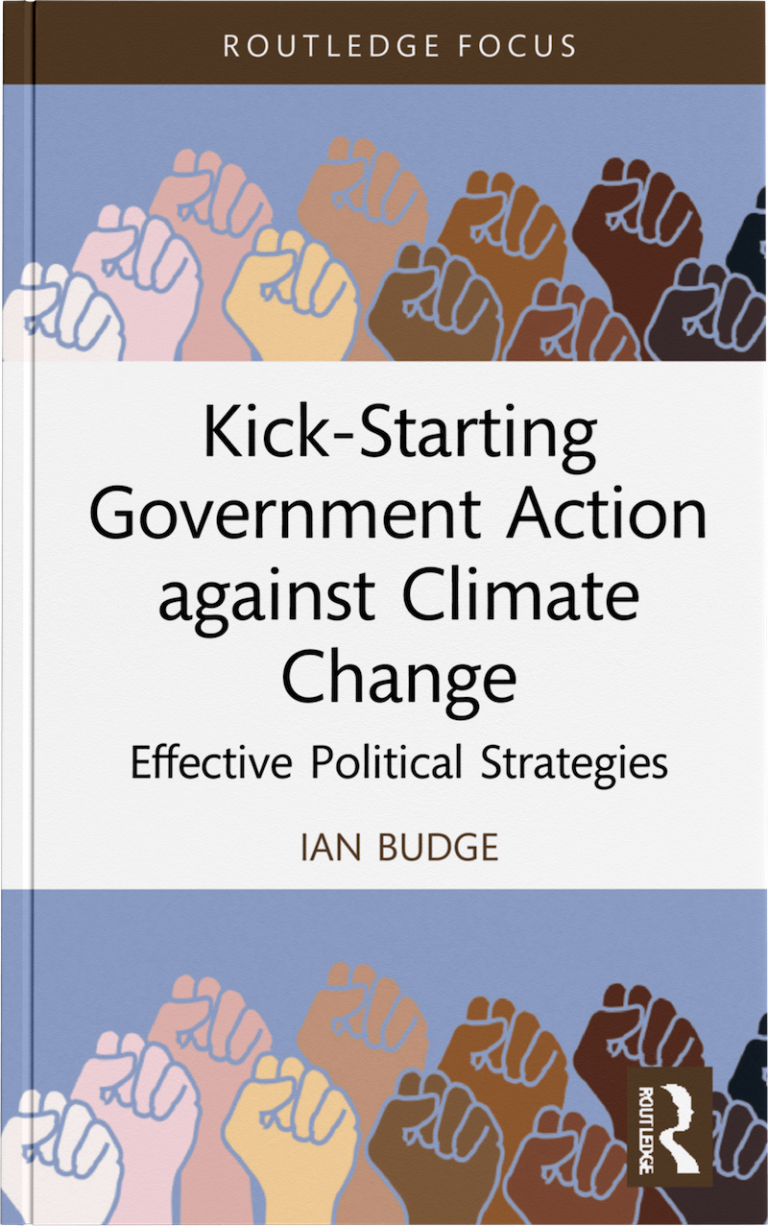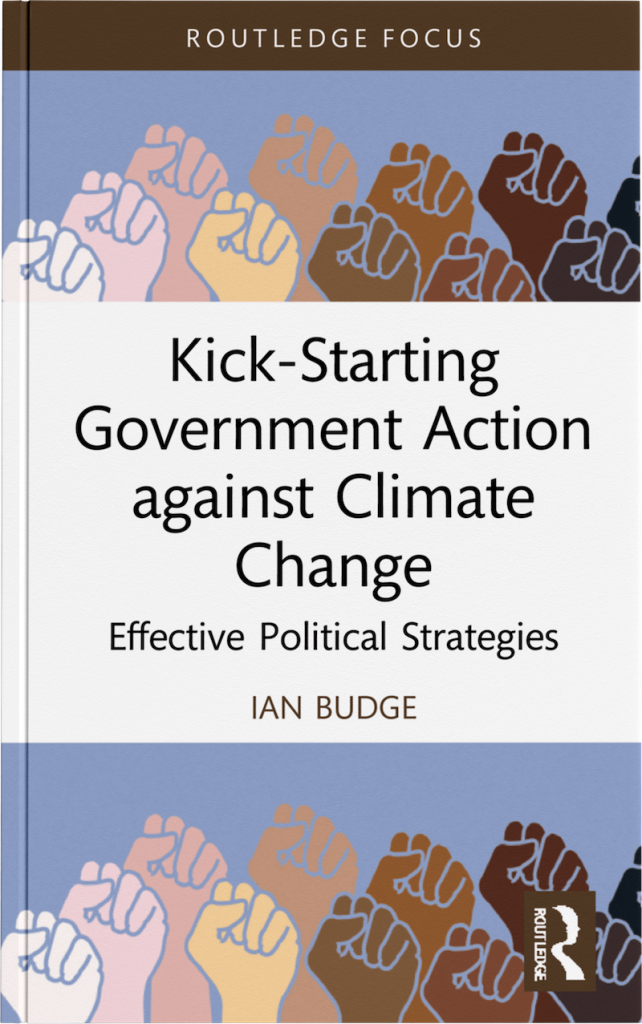Professor Ian Budge Presents
Kick-starting Government Action against Climate Change: Effective Political Strategies
An academic insight into what policies governments need to adopt to address climate change, and how the populace can organise effectively to take a proactive approach.
Get 20% Off Using Code: FLR40

Introduction
Kick-starting Government Action against Climate Change: Effective Political Strategies details what policies governments need to adopt and also how campaigners can get them to take on an active role. Demonstrations and discussions are not enough. We need to pressure governments where it really hurts, on votes and taxes. The book shows how to do this by organising effectively.
“I feel this is just the type of book we need given the lack of meaningful government action on climate change”.
Academic and Activist reactions to the book
“This is a fantastic idea for a book, and I think one that is badly needed”.
Academic and Activist reactions to the book
“I must congratulate you for the book, which is most welcome given the climate crisis we are facing”.
Academic and Activist reactions to the book
“An important and perfectly timed contribution to a growing debate”.
Academic and Activist reactions to the book
“It’s very accessible & I’m very much enjoying it”.
Academic and Activist reactions to the book
“It is very relevant, but one will also learn a lot about models of democracy, parties, and elections”.
Academic and Activist reactions to the book
Wow! I’ve just read the Preface which is really powerful and holds out the exciting prospect of a real possibility of change.
Academic and Activist reactions to the book

HOW DEMOCRACY WORKS: CAN CLIMATE CHANGE BE MADE A PRIORITY?
Democracies are the key to action on climate. Not only do they include the richest group of countries in the world, who as the major producers and consumers in a globalised setting are capable of exerting enormous pressure on other governments (not to mention military interventions). They also, internally, offer much more latitude for political pressure to be exerted through their guaranteed rights and freedoms.
A central question is whether Green parties and supporting ecological movements have succeeded in exploiting these to the full in getting their message heard? In spite of local successes, they have not been effective so far in averting the crisis now upon us. This leaves open the question of whether this is a failure on their part or whether the structural constraints inside democracies render it difficult or impossible for them to do so.
We tackle the question by first of all considering how the central democratic processes necessary to make major switches in policy normally work – and whether this eliminates the possibility of any serious advance measures being taken before climate catastrophes provoke panic reactions. Our conclusion is that they do make them difficult. Democracy works well in its own terms. But a) these require time, which we do not have and b) need to gain majority support, since the essence of democracy is to bring public policy into line with popular preferences for it. This again takes more time than we have, even if Green parties and movements were ultimately to be successful in mobilising mass support.
What possibilities then remain for getting governments to act now? Democratic arrangements do leave room for political pressure to be applied in areas to which governments and public are not currently paying attention, even in the face of scientific argument and mass demonstrations. Putting greater pressure on governments also requires that climate activists combine to exploit the many tax-avoidance schemes through which the rich and their multinational companies avoid taxation while turning it to better uses like a minimum income guarantee. To do this however ecological movements need to organise and innovate in the same way as businesses and multinationals. Unlike them they could make extra arrangements to divert money into climate-calming causes, without having negative effects on public services at home.
The hurricanes, floods and wildfires of 2020 and 2021 are a concrete sign that a tipping point is being reached when natural processes of carbon dioxide absorption reverse to produce more themselves (forests burning, ice melting, seas heating and flooding).
Having first denied the evidence for climate change, politicians and economists have now anchored themselves in a comfortable interpretation of what is going on. That is, that natural processes will remain stable in the face of human emissions, still absorbing most of the heat-transmitting gases, while we slowly bring these under control by reducing our own carbon output to zero by 2050.
The problems of taking climate initiatives are compounded by having to get the agreement of around 200 country governments for any concerted global action.
Governments are crucial in combatting climate change however much we try to do individually.
Only they have the powers to regulate polluting emissions effectively and get others to do so too. Unfortunately, their natural tendency is to prioritise short-term issues like national economic growth. So they have to be pushed into action on climate change, even though it is gearing up right now.
The hurricanes, floods and wildfires of 2020 and 2021 are a concrete sign that a tipping point is being reached when natural processes of carbon dioxide absorption reverse to produce more themselves (forests burning, ice melting, seas heating and flooding. And this is all happening in the 2020s! – not postponed to 2050!
Book Preface
Present dangers, present actions
The Covid- 19 pandemic of 2020– 21 shows how quickly our present socioeconomic and political arrangements trigger natural catastrophes, threatening our very existence on this earth. The more global these arrangements, the more the threat from unlimited trade and travel grows. This particular virus may have been contained – just. But who knows what the next will bring? And what other self-inflicted threats loom over us?
There is a close parallel here with climate catastrophe. Our global industries and economies are triggering a reversal of the natural processes that have, up to now, made planetary living conditions tolerable. Once these processes reverse themselves, we will be unable to reverse them back. Our current socio-economic and political arrangements are enough to set the world heating up. But we cannot then stop it. Only if we take political action now to reform our collective behaviour can we survive in anything like the shape we are in.
REPENT FOR THE END IS NIGH! Taken out of a Biblical context, that is the message of this book. It is, however, directed more at governments than individuals. As the Covid crisis shows, governments are the key policy-making bodies that can initiate action on behalf of all of us. What individuals can and must do is make governments act immediately to stop temperatures rising to unprecedented levels in the 2020s – a process that has already started. Forests from the tropics to the sub- Arctic are already burning on a vast scale, emitting carbon rather than absorbing it. With the increased heat more forests burn, starting with the most vulnerable continent, Australia, in 2019 and spreading every year through California. Sub-Arctic fires are also spreading, to peat bogs as well as to forests, contributing to a meltdown of the Polar ice caps themselves. Instead of reflecting the sun’s heat back into space, the newly exposed surfaces absorb it. Meanwhile, the oceans covering four fifths of the globe heat and flood, a process that will end with frozen gas deposits from their depths burning on their surface. All of these effects, set off by human emissions, are accelerating in a vicious cycle beyond our control. The consequences in the shape of unpredictable weather, floods, famines, animal and plant extinctions, new pandemics (and much, much, more!) add up to an apocalypse of Biblical proportions.
Having first denied the evidence for climate change, most politicians and businessmen have anchored themselves in a comfortable interpretation of what is going on. That is, that natural processes will remain stable in the face of human emissions, still absorbing most of the heat-transmitting gases, while we slowly bring these under control by reducing our own carbon output to zero by 2050. This comforting long-term perspective absolves governments from any major effort now. Aspirations for reducing emissions can be expressed and climate emergencies declared, while party governments get on with the really serious business of restoring national economic growth after Covid, through increased emissions if necessary (Chapters 2 and 3 below). The problems of taking environmental initiatives are compounded by having to get the agreement of around 200 country governments for any concerted global action. Scholarly and scientific attempts at puncturing government complacency have mostly consisted in making an ever-better founded case for immediate action, but leaving it at that, as though the accuracy of climate science itself is the problem rather than the political will to act on it. The few analyses that have focused on climate politics (listed in the end Bibliography) have mostly viewed them in abstract terms – getting agreement on negotiating procedures rather than kick-starting concrete action here and now. Drawing on professional research on party and government behaviour, this book discounts the possibility of getting unforced action to reduce carbon emissions. Instead, it focuses on how governments – even non-democratic ones – may be pushed into taking scientifically- based counter action by the popular and expert pressures specified below.
The likely switch from climate-focused action to promoting economic growth after Covid is all the more tragic since the necessary uplift could be provided by tackling the wider environmental errors contributing to climate change. To name only a few: leaking water supply systems and polluting sewage releases into rivers need to be fixed; landfill sites can be mined for now scarce materials and their methane emissions channelled into clean energy production rather than released into earth and atmosphere; carbon-absorbing reforestation and rewilding of the countryside can provide jobs at all levels, often in poorer regions where they are most needed; house insulation can be undertaken everywhere, since outside Scandinavia something like 40 percent of harmful carbon emissions are domestic.
All these positive initiatives would, by creating jobs, reduce demands on another climate and economy-supporting measure – the minimum income guarantee discussed below. Both this and environmental reconstruction are better ways of providing an economic boost than military expenditure or giving away public money to banks and businesses to hoard or invest as they think fit (‘quantitative easing’).
An environmental ‘New Deal’ runs up against the ideological shibboleths of public finance – ‘public bad, private good and ‘balancing the books’ – considered in Chapter 3. These beliefs, however, have been suspended – even by governments endorsing them – during theCovid pandemic. They also run up against the latest economic thinking embodied in new monetary theory, that responsible governments can build up financial confidence with necessary projects. Indeed, lenders in 2021 are currently paying governments to take their money, with zero interest prevailing during the Covid emergency. The new international agreements of June 2021 on taxing multinational corporations realistically provide additional financial support for environmental reconstruction. International action, however, is undermined by the ability of each government to plead its own special case for carbon-increasing developments, while blaming others for their consequences (like Australia opening up new coal deposits in the aftermath of the 2019 fires that destroyed an eighth of its forest cover).
Actions by individuals to reduce warming are limited and ineffective if governments are not prepared to support them and act against those who will not cooperate. Even the technological advances that have developed in part response to the climate crisis and can reduce our carbon emissions – solar, wind and hydroelectric generation, electric cars, house insulation – are not going to be applied quickly enough unless governments enforce their use and ban carbon usage. This is as true of targets set for 2050 as it is for the crisis already with us in the 2020s.
Even relaxed long-term targets are not being met – or even set – by more than a third of world governments, in spite of international climate conferences being held with increasing frequency. Holding these (in spite of some real achievements) is part of a general political smokescreen of promising climate action while in practice delaying it. But even the crucial World Climate Conference (COP26) due to be held in 2020 was postponed for a year by the British Government, while US adherence is hugely dependent on which party holds power in Washington, with Republicans denying climate change altogether.
In the face of such political inertia, what can individuals do? It is tempting to conclude that nothing can be done – just enjoy the economic benefits while we have them. Most folk, however, having just experienced one world crisis, want to do what they can to avert the next – if not for themselves then for their children. Their problem is not knowing what individual actions will make a difference. The current alternatives on offer – voting Green in elections, mass demonstrations, direct action against oil/ gas extraction – have not stopped climate changing emissions over the last 30 years nor substantially protected the environment.
However, there are other ways in which individuals – acting together as well as individually – can make a real difference. A first essential is to organise action on a permanent basis so that potential campaigners have continuing guidance and help on what to do about climate disaster. A good precedent lies in the social crusades of the 19th century, particularly the organisations that committed their adherents to a written pledge to take specific steps within their own control (e.g. in the case of the Temperance Movement abstaining from alcohol). There is no reason why national organisations should not sign up individuals to a list of similar pledges – to cut their carbon and plastic consumption; eat less meat; maintain wildlife gardens; abstain from cruises and air flights; insulate houses and so on. Individual resolve could be strengthened by websites and individual tweets, local branch activities and meetings – all to reinforce collective action and solidarity. Individual subscriptions and crowdfunding could also be used to finance the national and international initiatives detailed below.
Another precedent for collective action is more directly political – the mass boycotts of apartheid South Africa in the 1980s. Boycotts could be organised effectively against countries burning rainforests by pledging always to enquire (and refuse to buy) products containing palm oil or South American beef and to push supermarkets and distributors selling them into action against them, at board level as well as middle management. Another action would be individuals pledging not to take plastics or products contained in plastics among their purchases, and/
or to dump them on the supplier if they do. Investors could also check whether companies they have shares in are ecologically responsible, and either withdraw their money or agitate for change at annual general meetings and/ or in written communications. (Successful action of this kind elected two activist Directors to the Board of Exxon, a notoriously polluting US oil corporation, in May 2021.)
Many other types of initiatives by individuals and companies could be undertaken. With mass support these could fill in a bit for governmental action, or, like their 19th century predecessors, actually pressure governments to act. The first essential, however, is to organise so as to harness individual efforts on a continuing basis to make a collective and sustained rather than a dispersed and sporadic impact on the changes going on. This is not to say that existing ecological movements have not been highly successful in securing media coverage and especially in influencing public opinion. But they are constrained in actually implementing their policies by the political institutions and procedures they work under. These are mostly designed to hamper rather than encourage new policy initiatives.
One limitation on all climate-related campaigning is its appeal mostly to non-manual, educated professionals who have both the time and energy to take far-reaching political action. This is a limitation that must be overcome by reaching out in an organised way to the general public (Chapter 5). It is also true, however, that middle class groupings provide most of the tax basis that governments rely on to finance their activities. This gives climate change opponents a substantial if not decisive clout in dealing with them by withholding payments in perfectly legal ways for activities of which they disapprove – but only if they organise to do so. Chapter 6 suggests how to do this, while still keeping such action within democratic bounds and not hurting public services.
However, it is always necessary to get the larger public onside. The problem is how, given that many live under socioeconomic circumstances that make feeding their family the overwhelming priority, rather than anything that might affect them next year. To give ordinary people the security to take a long-term view, Green parties and ecological movements need to counter the economics that insists that ‘s/ he who does not work (or loses their job) shall not eat’. They can reach out at both the ideological level (Chapter 3) and practically, by campaigning for a permanent minimum income guarantee for all. (Incidentally ensuring a ‘just transition’ for those who lose jobs in an ecological clean-up.) This would extend the measures already adopted in many countries during the 2020 pandemic and shown to be feasible then. What a long-term income guarantee might look like is discussed in Chapter 5.
Divorcing life chances from jobs destroys the main justification supporting carbon emissions. This is that environmental degradation is necessary because national economic expansion and growth are the only way to finance any social or environmental improvement. A massive environmental regeneration – an ecological New Deal – and a decent income guarantee for losers would be alternative paths both to economic recovery and clean growth.
Income redistribution and cutting excessive consumption, rather than climate-damaging economic growth, are the real necessities for recovery after Covid. This would give climate change campaigners, particularly Green political parties, a winning electoral message for those who cannot afford to take climate change into account as things stand. These points are expanded in Chapter 5. Again, political organisation is required for popular mobilisation behind these issues.
All this demonstrates that organised individual actions – organised, coordinated and with clear plans for immediate collective initiatives – can have a great impact. It is still true, however, that national governments are the key, since they ultimately control developments within the territorial units into which our world is divided. In the absence of a world government to promote planetary action, national governments can also influence and coerce others into taking climate calming initiatives (e.g. governmental boycotts of goods from environment-destroying countries can powerfully supplement the individual ones discussed above).
However, given their current willingness to abet climate-changing developments and unwillingness to regulate them – all in the name of cheap imports and fostering growth – governments must be pushed by their citizens into action. This makes democracies and their governments the key political arena for defusing heat emissions. Their extended freedoms render citizen initiatives possible, even if we have to push the political boundaries somewhat to do this (Chapter 6). Democratic governments can also be pressured to act internationally, again prompted by citizen initiatives.
The following chapters go into detail about this, starting with the universal scientific consensus that absurdly little is actually being done to tackle climate change, even on the most optimistic incrementalist view. The catastrophic reversals happening now render action even more imperative – a matter of basic survival not only for humans but for everything in the world as we know it. This book details the collective strategies we need to avert this, starting from the fact that democracies are central to effective world action, and that political parties and governments are the key actors within them.
Further reading and reflection
Limitations on individual action to cut emissions are illustrated by reports in the Independent newspaper of 14 March 2020, pp 28– 29, where four professional workers reported their experiences in trying to live on a carbon emissions budget of one tonne annually (averaging 2.74 kilogrammes per day). This is what is calculated to be the average sustainable level of emissions per person in the world by 2050. The major items where cuts counted were housing, food and travel. All the people involved lowered their house heating and went on a vegetarian diet. While they walked or cycled as much as possible, their jobs mostly required public transport to get to work, or air travel to visit business contacts or to attend conferences. Such travel blew great holes in their carbon budget, while lowered heating was distinctly uncomfortable in most cases owing to a lack of proper house insulation.
This illustrates that even laudable action by individuals is bound to have limited effects in the absence of direct government intervention (ending transport subsidies, particularly for air fuel, legislating for more home working to avoid travel; environmental restoration; raising building standards and subsidising insulation for older houses, to name but a few). Individuals should do what they can. But major results can only be achieved by banding together in sustained collective action, particularly political initiatives, to force governments into reducing emissions both domestically and internationally. Without continuing organisation and pressures from the grass roots they will always prioritise other short-term concerns and ideological responses (see especially Chapter 3 on this). A shocking statistic is that the unsustainable decline in polluting activities during the Covid- related lockdowns of 2020 only reduced harmful human emissions by 17 percent worldwide when the goal for the decade has to be 100 percent!
A masterly overview of the interlinked climatic and environmental threats is David Attenborough’s A Life on Our Planet (London: Witness Books, 2020). This emphasises comprehensive restoration of the planetary environment as the only way to solve the climate crisis. As with almost all writing in this area, however, it details the science and specifies what needs to be done but not how to get it done. This book bridges the gap with its analysis of the collective political strategies needed to kick-start real action.
Chapter Titles

Forests Burn, Ice Melts, Seas Surge, Weather Worsens – What Governments Have Done and Not Done

Problems of Collective Action: Policy Making and Enforcement

Dominating Political Discourse

Making Climate the Issue

Strengthening Mass Appeal: Guaranteeing a decent income for all

Organising to expand Democratic Action

Climate Action in Non-Democracies

Climate Action in the World Arena

About The Author
Ian Budge is a political scientist known internationally for his extensive research on governance, political parties and democracy across the world. Due to the urgency of climate change, he has drawn on his professional background to suggest better political strategies for pushing governments into effective action against it, both nationally and internationally.
Active for fifty years as a political scientist, Ian Budge has made major contributions both to cumulative research on democracy and to organizational developments in the discipline. His earliest research on Glasgow and Belfast focused on causes of democratic breakdown. After a middle period studying elections, voting behaviour and party competition he turned to public policy and how it could be made responsive to popular preferences – the central democratic dilemma. His research covers both Direct and Representative Democracy.
Awards

Lifetime Achievement Award

Best data Set Award

Best Paper
Latest News
Contact Us

